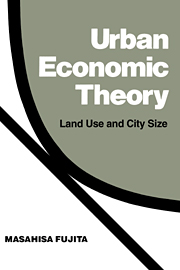1 - Introduction
Published online by Cambridge University Press: 23 December 2009
Summary
Nature of the book
The history of cities is almost as old as that of civilization. Cities have been centers of wealth and power, innovation and decadence, dreams and frustrations. During the past several decades, many countries have experienced rapid urbanization. As a consequence, a large proportion of the world's population now resides in cities. Yet cities are among the most complex human creations, and in many ways the least understood. This became dramatically clear with the eruption of urban problems throughout the world starting in the late 1950s. Since that time, a great number of scientists in various fields have endeavored to develop a better understanding of cities. With respect to economics in particular, these urban problems have triggered the birth of a new field, namely urban economics.
Modern urban land use theory, which forms the core of urban economics, is essentially a revival of von Thünen's theory (1826) of agricultural land use. Despite its monumental contribution to scientific thought, von Thünen's theory languished for more than a century without attracting the widespread attention of economists. During that time, cities grew extensively and eventually outpaced the traditional concepts of urban design. The resulting rise in urban problems since the late 1950s has manifested an urgent need for a comprehensive theory of modern urban systems and, in particular, has helped to refocus the attention of location theorists and economists on the seminal work of von Thünen.
- Type
- Chapter
- Information
- Urban Economic TheoryLand Use and City Size, pp. 1 - 8Publisher: Cambridge University PressPrint publication year: 1989



